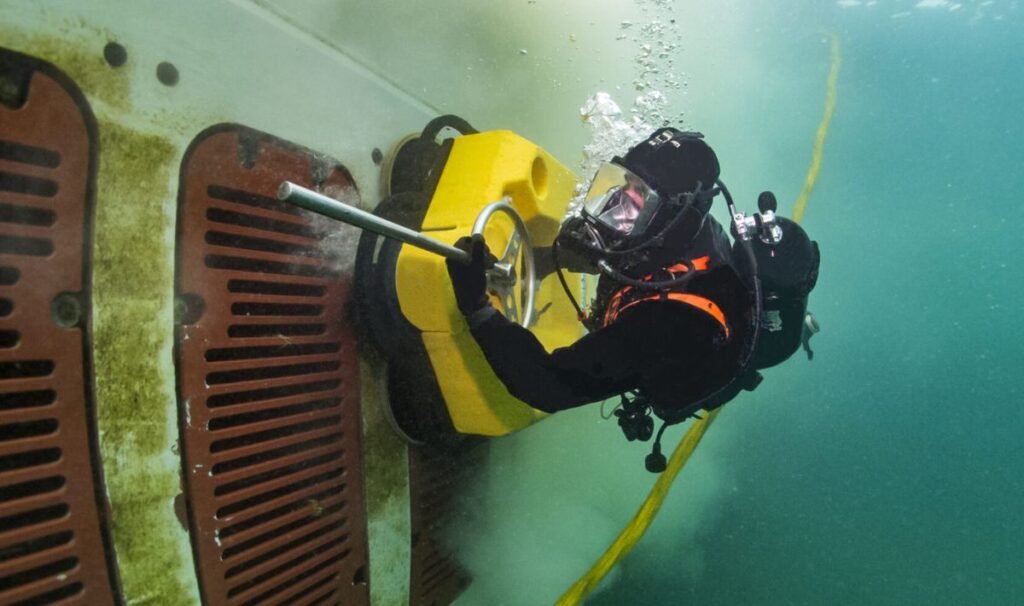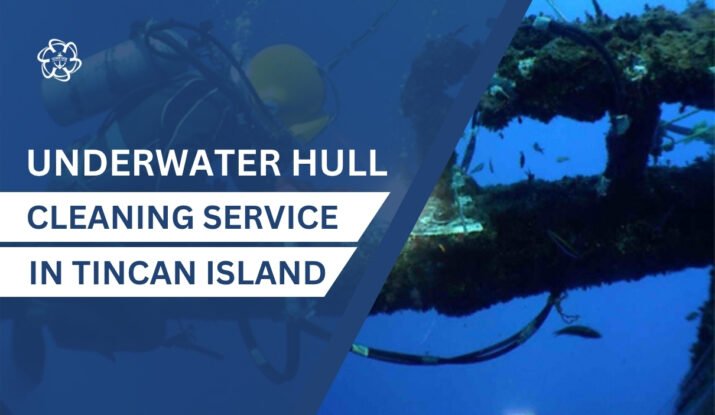Operating a vessel underwater hull cleaning in Tincan Island’s high-traffic waters means staying ahead of performance issues. Beneath the surface, marine buildup can silently drag you down—literally. Every port call demands efficiency, and a clean hull is key to staying competitive.
Marine growth, like barnacles, algae, and slime, accumulates on the hull, increasing drag and fuel use. It can cause delays, inspection failures, and high operating costs. In Tincan Island’s demanding shipping lanes, neglecting hull cleaning leads to lost time and profits.
Underwater hull cleaning in Tincan Island removes biofouling fast and efficiently, without dry-docking. The result? Better fuel economy, smoother sailing, and stress-free port inspections. Stay compliant, save money, and keep your vessel performing at its peak in Nigeria’s maritime hotspot.
Understanding Underwater Hull Cleaning in Tincan Island
Underwater hull cleaning is the process of removing barnacles, algae, and other marine organisms from the submerged parts of a ship’s hull. Over time, these creatures latch on and create drag, making your vessel work harder and burn more fuel. Think of it as clearing weeds from a garden—regular attention keeps everything running smoothly.

Why Underwater Hull Cleaning in Tincan Island is Crucial
Tincan Island stands as one of West Africa’s busiest shipping gateways, with a steady flow of vessels navigating its waters daily. This constant maritime activity accelerates the accumulation of biofouling—marine growth like algae and barnacles—on ship hulls, which can hinder performance and increase fuel consumption. Regular underwater hull cleaning in Tincan Island is essential to maintain vessel efficiency, reduce operating costs, and ensure smooth operations.
It also helps shipowners comply with port regulations set by the Nigerian Ports Authority (NPA), minimizing the risk of inspections, fines, or costly delays. By staying proactive with hull maintenance, vessels operating in Tincan Island remain competitive, environmentally compliant, and ready for the demands of Nigeria’s dynamic maritime sector.
Unique Conditions at Tincan Island Port
Tincan Island’s port is known for:
- Heavy commercial traffic
- Warm, nutrient-rich waters
- Extended idle times for vessels awaiting berth
These factors create a perfect storm for rapid marine growth on hulls, making frequent cleaning not just a good idea, but a necessity.
Common Causes of Hull Fouling in Tincan Island
- Warm water: Accelerates algae and barnacle growth.
- High vessel density: Ships spend more time stationary, giving organisms time to settle.
- Industrial discharge: Increases nutrients, fueling marine life.
Types of Underwater Hull Cleaning Methods
Manual Hull Cleaning
Divers use brushes and scrapers to remove buildup. This method is best for small vessels or targeted cleaning and is widely available at Tincan Island.
Mechanical and Robotic Cleaning
Larger ships benefit from rotary brushes, hydraulic scrubbers, and even robotic hull cleaners. These methods are faster, more thorough, and safer for divers, and are increasingly offered by local service providers.
Step-by-Step Process of Hull Cleaning in Tincan Island
Pre-Cleaning Inspection
Before cleaning, divers or ROVs (remotely operated vehicles) inspect the hull for fouling and damage. This assessment ensures the cleaning process is safe and effective.
The Cleaning Operation
Divers or machines systematically clean the hull, starting at the bow and moving aft. They focus on removing all visible growth while protecting the hull’s coating.
Post-Cleaning Assessment
After cleaning, a final inspection checks for missed spots or potential damage. Many providers offer photographic reports as proof of service.
Benefits of Regular Hull Cleaning
Fuel Efficiency and Cost Savings
A fouled hull can increase fuel consumption by up to 20%. Regular underwater hull cleaning in Tincan Island keeps your vessel gliding efficiently, saving you money on every voyage.
Environmental Impact
Clean hulls burn less fuel, reducing emissions. Responsible cleaning also helps prevent the spread of invasive species between ports.
Choosing a Hull Cleaning Service in Tincan Island
What to Look For
- Certified, experienced divers or robotic operators
- Modern equipment and eco-friendly practices
- Transparent pricing and detailed reports
- Strong reputation and positive client feedback
Questions to Ask Providers
- Are your divers certified and insured?
- What cleaning technology do you use?
- How do you manage waste and debris?
- Can you provide before-and-after inspection documentation?
Regulatory Compliance and Safety Standards
Tincan Island’s port authorities enforce strict safety and environmental standards for all underwater work. Reputable cleaning companies comply with local and International Maritime Organization, ensuring your vessel meets inspection requirements and avoids fines.
Cost Factors for Underwater Hull Cleaning in Tincan Island
Several variables affect pricing:
- Size and type of vessel
- Degree of fouling
- Cleaning method (manual, mechanical, robotic)
- Frequency of service
- Additional services (propeller polishing, underwater inspections)
While advanced methods may cost more upfront, they often deliver better results and reduce long-term expenses.
Tips for Maintaining a Clean Hull
- Schedule regular inspections and cleanings
- Apply quality anti-fouling coatings
- Minimize idle time in port when possible
- Keep a detailed maintenance log
Conclusion
Underwater hull cleaning in Tincan Island is far more than routine maintenance—it’s a critical strategy for ensuring vessel efficiency, regulatory compliance, and long-term performance. In one of West Africa’s busiest ports, marine growth like algae and barnacles accumulates rapidly, increasing drag, fuel consumption, and the risk of costly delays. Regular hull cleaning removes this biofouling while the ship remains afloat, saving time and money.
With the right service provider and a proactive maintenance schedule, shipowners can improve fuel efficiency, pass port inspections smoothly, and extend the vessel’s lifespan. In a high-traffic environment like Tincan Island, clean hulls are key to smooth operations, reduced emissions, and maintaining a strong position in Nigeria’s competitive maritime landscape.
FAQ:
Q1. How often should underwater hull cleaning in Tincan Island be scheduled?
Most vessels benefit from cleaning every 3–6 months, depending on usage and fouling rates.
Q2. Can hull cleaning be done while the ship is loaded?
Q3. Are robotic hull cleaning services available at Tincan Island?
Q4. Is underwater hull cleaning in Tincan Island environmentally safe?
Q5. What’s the main benefit of regular underwater hull cleaning in Tincan Island?
The biggest advantages are improved fuel efficiency, lower operating costs, and compliance with port regulations—helping your vessel stay ahead in a competitive maritime environment.


